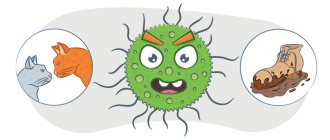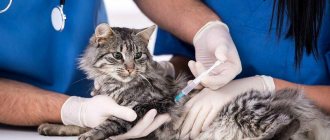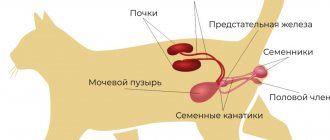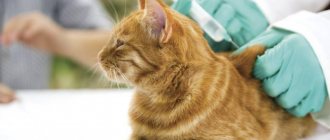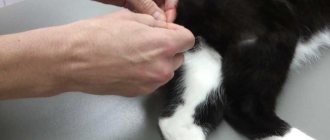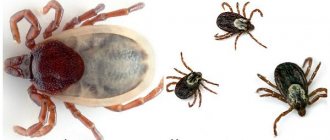Vaccination of cats and kittens is an integral part of pet care. All of them have diseases that are not at all dangerous to humans, but carry a mortal danger to animals.
The owner can bring pathogenic viruses into the house on shoes and clothes, thereby infecting the pet. That is why it is important to prevent the disease in time.
Why do cats need vaccinations?
Vaccinations for cats differ little from human vaccinations and any other vaccinations. The animal is injected with a drug containing weakened bacteria and viruses. When they enter the body, they provoke the production of specific antibodies, which in turn form a stable immune defense against harmful microbes and various diseases.
It is noteworthy that a cat must be vaccinated, even if the animal is constantly at home. The fact is that viruses that can infect a pet are literally everywhere. They can be found in the air, water and food of a cat, and a person can also carry the bacteria on his clothes.
The first vaccinations for a kitten are given at a very early age - 2 months. This helps to form a strong immune system and protect the baby from external harmful influences. Vaccination is carried out strictly in accordance with the approved schedule; before the injection, double deworming must be carried out with a break of 10 days. You also need to treat fleas and ticks on the animal’s body.
Immediately before the vaccine is administered, the pet is examined by a veterinary doctor, and additional tests are prescribed if necessary.
Why do cats need to be vaccinated?
Throughout their lives, our smaller brothers, regardless of breed or age, are susceptible to infectious diseases. It is worth noting that viruses and bacteria are ubiquitous in the environment. Moreover, even if your cat does not leave the threshold of a house or apartment, this does not mean that he is completely safe. You can bring pathogens of infectious diseases into your home on clothes, shoes, and household items. The infection can also be caused by other pets, for example, dogs that walk along the street or come into contact with their relatives.
Vaccines for cats
Some viral, bacterial, and parasitic infections pose a real threat to the life and health of furry purrs. Therefore, we strongly recommend not to neglect preventive vaccinations.
What diseases are cats vaccinated against, age and medications
When visiting a veterinary clinic with a small kitten or an adult cat, doctors recommend vaccinations against the following diseases:
- feline herpes virus, manifested as rhinotracheitis;
- calicivirus;
- feline distemper;
- chlamydia;
- infectious peritonitis;
- ringworm.
In some cases, preventive vaccinations are given against various types of parasites, for example, ticks, fleas and others. Today there are a huge number of drugs, which, as a rule, are administered in a complex manner.
A newborn kitten has the opportunity to be protected by antibodies obtained on the first day after birth. He receives them with his mother's colostrum during feeding. However, such immunity will not be able to protect the baby for longer than 16 weeks.
In addition, it should be understood that the kitten receives immunity only to those viruses and infections against which its mother was previously vaccinated.
It is not recommended to vaccinate a small cat before 10 weeks of age. Passive immunity received from the mother will prevent the body from effectively producing antibodies to diseases. However, if there is a danger of the animal becoming ill, the vaccine is given between 6 and 16 weeks of age.
The choice of vaccine and the age of the animal when the vaccination will be given is made exclusively by a veterinarian. This is explained by the fact that cats, like people, are highly individual, and you need to look at the pet’s health. But there is a general list of vaccines against diseases and the age of animals when these vaccinations need to be given.
It is advisory in nature and is not required to be strictly followed. When vaccinating, you should always follow the opinion of the observing specialist.
The first vaccination is carried out against respiratory diseases (rhinotracheitis, calcivirus and panleukopenia) - 9-12 weeks of the pet’s life. Together with them, a vaccination against chlamydia is given. Revaccination – after 2-4 weeks.
At 16 or 20 weeks of age, kittens are given a vaccine against infectious peritonitis. Repeated vaccinations are prescribed a year after the first.
Detailed terms, rules of use and adverse reactions can always be found in the instructions for the drug.
Care after vaccinations
The cat may not feel very well for 3-4 days after the injection. The animal shows little activity, sleeps more, eats 1 instead of 2-3 times a day. This phenomenon is considered the norm, since the body has directed all its forces to fight the introduced infection. Therefore, during this period it is important not to disturb the pet, constantly monitor its well-being, provide warmth, comfort, protect it from stress, and feed it as needed. If the owner notices that his four-legged friend has become worse, you should not self-medicate, but seek help from a veterinary clinic as soon as possible.
Mr. Cat recommends: Types of vaccines
There are four types of vaccines, which determine the duration of the vaccination and the range of effects on the body.
Depending on the impact, they are distinguished: monovalent and polyvalent. They are distinguished from each other by the degree of impact, protection from one specific disease or complex protection from two or more pathologies.
There are also active and inactive vaccines. They are divided by duration of action. The former contain live but weakened strains of bacteria and viruses, while the latter contain “dead” strains. Vaccinations with non-living pathogens will have a short duration of action.
Self-selection of a vaccine is not recommended. Only an experienced veterinarian can choose the drug that is most suitable for your pet.
What types are there?
Vaccines for cats and kittens are as follows:
There are different types of vaccination, during which a weakened pathogen is introduced into the body, stimulating the immune system.
- Monovalent. The drug helps develop immunity against one type of infectious disease.
- Polyvalent. A complex vaccination for cats, after administration of which antibodies are formed aimed at combating two or more pathologies.
- Active. The drug contains a weakened virus or fungus that causes asymptomatic infection with the subsequent development of a protective immune response. This vaccination lasts for a long time, protecting the cat from infection.
- Inactive. They contain a dead virus, to which protection is formed that lasts for a short time.
Rules for vaccination and revaccination
Vaccination is a very responsible event, before which your pet needs to be carefully prepared and its health status checked. It is important to check that on the day of vaccination the kitten is:
- active and cheerful;
- body temperature did not exceed 38-39°C;
- there was no discharge from the eyes, nose, as well as sneezing and coughing;
- the animal ate well.
Before vaccination, communication with other cats that show signs of illness is strictly prohibited. It is also important to remember that only pets over 2 months of age are eligible for vaccination.
10 days before the vaccine is administered, fleas and ticks on the animal’s fur and body should be treated. This can be done using special drops or collars.
They also carry out deworming, ridding the pet of possible infection with worms. It is better if this procedure is carried out twice with a break of 10 days.
It is not recommended to vaccinate within 3 weeks after surgery, if any. When treated with antibiotics, the medical tap is effective for 2 weeks. After this period, if all health indicators are present, the animal is vaccinated.
If the pet was picked up from the street, you need to undergo the necessary tests that will show the presence or absence of antibodies to certain types of diseases in the blood. It is strictly forbidden to re-vaccinate an animal.
The owner of a pet should obtain a veterinary passport, which will record the vaccination schedule, medications that were used and all health indicators of the pet.
To carry out vaccination, you need to choose an experienced doctor who will not allow violations during the procedure. Otherwise, complications or unwanted side effects may develop.
It is also better to entrust the choice of vaccine to a professional. However, you should adhere to the general rules for selecting medications:
- for a young kitten it is better to choose imported vaccines, since their effect on the body is milder;
- Vaccination is administered strictly in accordance with the instructions;
- You must first make sure that the expiration date of the substance is in accordance with the expiration date; it is unacceptable to use expired medicine.
For half an hour after administration, you need to sit within the walls of the veterinary clinic, observing the cat. At this time, an allergic reaction may develop. Therefore, it is better to be closer to the doctor at this moment.
The best vaccines
All drugs must have certificates certified by veterinary authorities. It is forbidden to use vaccines at your own discretion, without first consulting a veterinarian. The following vaccination preparations are considered effective:
Some of the effective drugs for the procedure are Quadricat and Leucorifelin.
- "Nobivak Triket";
- "Quadricate";
- "Leukorifelin";
- "Multifel-4";
- "Fel-O-Wax";
- "Microderm";
- "Polivak TM for cats";
- "Multifel";
- "Rabizin"
Vaccination schedule for cats
There is a generally accepted approximate vaccination schedule for cats and small kittens. In some cases, for a number of reasons, it is possible to deviate from the regimen and prescribe an individual set of vaccines.
| Name of the disease | First vaccine | Repeated vaccination |
| Calcivirosis | Between 8 and 12 weeks | A month later |
| Panleukopenia | At 8-12 weeks (simultaneous administration of vaccines is possible) | A month later |
| Rhinotracheitis | At 8-12 weeks (simultaneous administration of vaccines is possible) | A month later |
| Chlamydia | At 8-12 weeks (simultaneous administration of vaccines is possible) | A month later |
| Infectious type peritonitis | From 16 weeks | After 20 weeks |
| Trichophytosis and microsporia | From 8 weeks | After 10 weeks |
The timing of vaccinations may vary slightly depending on the cat’s health and the drug chosen. An individual vaccination schedule is selected only by an experienced veterinarian.
1111
Vaccination of cats: basic rules
For successful vaccination, you must follow the requirements established in veterinary medicine, as well as properly prepare your pet for the procedure.
Rules for vaccination and preparation of the animal:
- Strictly follow the vaccination schedule and schedule. The first vaccinations are given to kittens (8-12 weeks of age), followed by revaccination. Primary vaccination of an adult animal requires a repeat procedure after 2-3 weeks, then annual vaccination (at the same time of year).
- It is not recommended to vaccinate during teething changes (age 4 to 7 months)
- Vaccinations are prohibited for pregnant and lactating animals.
- The vaccination is done at least a month before the planned mating.
- Do not vaccinate a sick or weakened animal (for any disease).
- The cat is not immunized immediately after surgery and during the subsequent rehabilitation period.
- After vaccination, no surgical interventions are performed for the next two weeks (including planned castration). An exception is operations for life-saving reasons when it comes to saving an animal.
- When undergoing a course of antibiotic treatment, vaccination is allowed only 2 weeks after the end of therapy and only after agreement with a veterinarian.
- Cats that have been in contact with sick animals are not vaccinated.
- At least a week before vaccination, the pet must be provided with a calm environment (moving to another apartment, cottage, visiting exhibitions, traveling, etc. during this period is excluded).
- The procedure is carried out only after a thorough examination by a veterinarian and only on a completely healthy animal.
- Before routine vaccination, treatment against parasites should be carried out (drugs are selected on the recommendation of a doctor).
- Antiparasitic/anthelmintic drugs are given 10-12 days before the procedure.
- You cannot vaccinate yourself. Such procedures are the prerogative of a certified specialist – a veterinary doctor.
- In the first 24 hours after vaccination, your pet may be lethargic. But if this condition continues or any other additional negative symptoms appear, you should immediately contact your veterinarian.
Attention! Vaccination is an effective preventive measure that is successfully used all over the world (but not therapeutic, with the exception of vaccination against lichen). Therefore, even a vaccinated pet is not recommended to have contact with sick animals.
Types of drugs for vaccination
It was said above that the virus in the vaccine can be weakened (live) or dead. Live vaccines are made from weakened apathogenic pathogens that do not lose their ability to reproduce, but cannot cause harm. In order for the vaccine to remain effective, live vaccines are stored and transported at low temperatures (within 4-8°C) or frozen.
Live vaccines include anti-lichen vaccinations. More often, such vaccinations are given for therapeutic rather than preventive purposes.
global $ads_google; //data-ad-slot=”2475549904″ $ads_google = empty($ads_google) ? false : true; ?> if ($ads_google == false) {?>
$ads_google = true; ?> } ?>
Dead vaccines, killed by various methods, cause an immediate immune response. Inactivated pathogens contain drugs against panleukopenia, rabies, leukemia, rhinotracheitis, calicivirus and chlamydia.
Do vaccinations have side effects?
Typically, dogs and cats experience some or all of the following mild side effects after receiving the vaccine, usually starting within a few hours of vaccination. If these side effects last more than a day or two or cause your pet significant discomfort, you should contact your veterinarian:
- Discomfort and local swelling at the vaccination site;
- Slight increase in temperature;
- Decreased appetite and activity;
- Sneezing, mild cough, runny nose, or other respiratory signs may appear 2-5 days after your pet receives the nasal vaccine.
More serious but less common side effects, such as allergic reactions, may occur within minutes to hours after vaccination. These reactions can be life-threatening and warrant emergency medical attention. Seek veterinary help immediately if any of these signs develop:
- Persistent vomiting or diarrhea;
- Itchy skin that may appear uneven (“hives”);
- Swelling of the head and around the muzzle, neck, or eyes;
- severe cough or difficulty breathing;
- Collapse;
- A small, hard swelling under the skin may develop at the site of a recent vaccination. It should start to disappear within a few weeks. If it persists for more than three weeks, or it seems to be getting larger, you should contact your veterinarian.
Always tell your veterinarian if your pet has had a reaction to any vaccine or medication in the past. If you are unsure about your dog or cat's lack of reactions, wait 30-60 minutes after vaccination before taking your pet home from the veterinary clinic.
Vaccination of cats is carried out against:
- rabies;
- viral rhinotracheitis;
- calicivirus;
- chlamydia;
- panleukopenia.
If you have any questions or concerns, you can always visit or call our veterinarian - they are your best resource for ensuring the health and well-being of your pets.
Call us and we will be happy to advise you:
8-495-221-81-90
8-495-221-84-70
8-499-136-19-18
Where and how are animals vaccinated?
The vaccination should be done in a clinic where:
- The veterinarian will check the pet's health using thermometry. if there is a suspicion that the pet is unwell, vaccination is postponed;
- clinics care about their own reputation, so the vaccine is stored in the refrigerator and transported in a thermos with refrigerant;
- there is a minimal likelihood of a pet having an allergic response to the vaccine, so you should not leave the clinic for 15-20 minutes after the injection so that the veterinarian can help the pet;
- The doctor will make a note about the vaccination in the cat’s passport.
Minor vaccinations for a kitten
- "Vaccinations optional" for kittens include feline leukemia (FeLV)
, feline immunodeficiency virus (FIV), feline infectious peritonitis (FIP), Chlamydophila felis, and feline Giardia (giardiasis) vaccines. - The FeLV vaccine is recommended by some veterinarians for all kittens, while others recommend the vaccine only for kittens at high risk for leukemia. The decision should be based on your pet's lifestyle and discussion with your veterinarian. Feline leukemia is a viral disease that can be transmitted to kittens from their mother or through close contact with other infected cats. Kittens should be tested for FeLV infection prior to vaccination. Vaccinations can begin in kittens between 8 and 12 weeks of age and require a booster shot repeated after three to four weeks.
- The FIV vaccine is intended for cats at high risk of the disease. FIV is a viral disease that is most often spread from cat to cat through bite wounds. Vaccination against FIV produces a positive FIV test in tests, which is indistinguishable from infected animals. Therefore, practically this type of vaccination is not recommended for routine use. Vaccinated kittens must be tested for FIV prior to vaccination. The vaccine is not 100 percent effective. The first immunodeficiency vaccine can begin in kittens at 8 weeks of age and should be given two to three weeks apart to receive three consecutive vaccine injections.
- The Chlamydophila felis (chlamydia) vaccine is only used when keeping multiple cats where the infection is known to be present. Chlamydophila felis causes conjunctivitis and breathing problems in infected kittens. The first chlamydia vaccine can be given to kittens at 9 weeks of age or older when needed and should be increased after three to four weeks.
- FIP and Giardia vaccines are not generally recommended due to questionable effectiveness and safety. These vaccinations are still being tested and are not widely used in the veterinary community.
Vet clinic
Our specialty is reflected in our name – a good veterinarian.
A large number of clinics allow us to provide assistance to animals without wasting time and money on travel - this allows us to declare that we are always nearby, and we are ready to take responsibility for the life of your four-legged friend.
The veterinary clinic is an ambulance for your pet!
A veterinary clinic with experienced doctors provides emergency care for sick animals. It often happens that for a whole day a cat or dog felt great, played happily - and suddenly their condition worsened sharply. What to do in this case? There is a solution: this is a 24-hour veterinary clinic. You can bring your pet here at any time - day or night.
24-hour veterinary clinic: doctors will see you immediately!
It is extremely convenient for animal owners that the veterinary clinic is open throughout the day. Routine vaccinations can be done during the day. Emergency admissions to four-legged patients are provided as needed.
This type of service is convenient and beneficial for animal owners who are busy with service matters during working hours. They experience difficulties of various kinds: they do not have time to vaccinate, cut the dog’s hair, trim the cat’s claws, or sterilize. A veterinary clinic that serves clients 24 hours a day without a break allows you to solve the listed problems freely, without much stress. There is no need to take time off from work when you need to carry out an important pet care procedure.
Consulting services
Information about the rules for keeping cats, dogs, rabbits, guinea pigs, and hamsters is easy to obtain from various sources. It is advisable to first contact specialists with appropriate education. The clinic is staffed with highly qualified personnel: surgeons, anesthesiologists, and surgical assistants. Years of study at a higher educational institution have given them the knowledge that helps them quickly and efficiently carry out diagnostics, identifying the cause of a furry client’s illness. The result of this is to determine the correct treatment paths.
An important factor in ensuring good health is timely informing owners about all the dangers that may await their little friends. The veterinary clinic plays an important role in this matter: its employees are required to advise clients on the prevention of infectious diseases, the fight against worms, and the need for vaccination. Owners who love their “little brothers” have a lot of questions. Representatives of the medical staff of the Good Veterinarian clinic are ready to answer them.
The veterinary clinic is equipped with modern equipment
There is no doubt that a veterinary clinic equipped with the latest medical technology will be able to provide the best care to its clients. The in-depth knowledge of the medical staff may not be enough if the hospital does not have medicines or modern equipment for examinations and surgical operations.
Animals and people equally need quality care, and “The Good Veterinarian” meets the expectations of city residents, fully satisfying their needs.
The 24-hour veterinary clinic performs planned and urgent surgeries. Emergency care is a guarantee of survival for a dumb patient who urgently needs medical examination and care.
Come to the address indicated on the website. Kind, sympathetic, professional veterinarians will provide a warm welcome, help determine the cause of the animal’s illness, and carry out the necessary procedures and manipulations. We assure you: your pet will again be a cheerful, carefree, joyful creature, bringing moments of happiness to family members.
veterinary hospital
Why do kittens need to be vaccinated?
If you have a pet and keep it exclusively at home, this does not mean that it does not need primary cat vaccination. It has been scientifically proven that infections dangerous to pets can be brought in from the street on clothes or shoes. Those pets who do not leave the premises have a much higher chance of becoming infected than those who periodically walk outside.
Many infections can be fatal, so vaccination for kittens should be the responsibility of the owner. If you visit a veterinary clinic regularly or because of any disease, then there the animal may come into contact with sick individuals and become infected. In addition, surgery (sterilization, castration, etc.) reduces the kitten’s immunity and increases the risk of disease. If you have several pets, kittens should be vaccinated as early as possible.
Thus, the first vaccination for kittens, especially if it is a complex injection, is a reliable way to prevent serious diseases.
In what cases is vaccination contraindicated?
Vaccination is contraindicated in the following cases:
- Up to two months of age, since kittens have not developed immunity and lymphatic systems.
- Within two weeks after contact with an infected animal. After this period, you can vaccinate your pet if signs of the disease have not appeared.
- Signs of a cold (discharge from the nose, eyes).
- Peeling on the skin, which indicates the presence of microsporia. The fungus weakens the animal's immunity.
- Pregnancy and feeding kittens.
- One month after surgery.
With proper preparation and following recommendations, vaccination has no side effects. Vaccination will prevent the disease and save the cat's life.
This is how we vaccinate:
- The administrator meets you and your pet at the registration desk.
- We issue an electronic outpatient card.
- We conduct a general examination of the cat, measure its body temperature, and weigh it.
- If your pet is clinically healthy and you have no complaints about its general condition, then we inject an anti-allergy drug into the hip. Many breeds are very prone to allergic reactions, despite the "mild" modern vaccines.
- After a couple of minutes, we inject the imported vaccine into the withers area.
- We issue a veterinary passport (new or existing) in accordance with all requirements of the Russian Federation.
Preparing for vaccination
It should be stated right away: the official protocol does not require any preparatory actions from the patient. You just need to bring your Moscow registration document or work certificate with you to receive the vaccine for free.
To avoid a possible negative reaction of the vaccine components to the presence of the virus, it is advisable to test for the presence of infection or antibodies in the body before administering the drug.
Smart preparation for coronavirus vaccination includes:
- examination by a general practitioner;
- PCR test or rapid test for coronavirus to detect current infection;
- a test for IgG antibodies to the coronavirus S protein to determine the level of the immune response.
These tests will determine whether there is currently an infection in your body, as well as find out the level of antibodies to SARS-CoV-2 if you previously suffered from the disease in a latent form.

